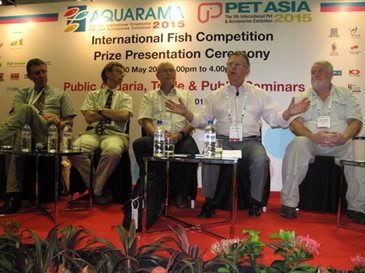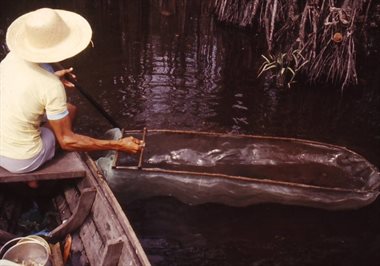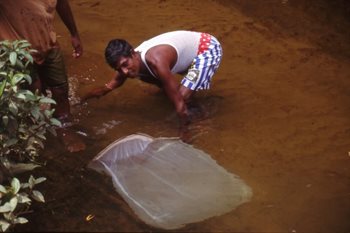On reflection of World Environment Day on June 5th. We're delighted to present an interview with our alumnus John Dawes (1963-1966).
John is a leading expert on fish, aquaria, ponds, and water gardening. Born in Gibraltar and having pursued a teaching certificate at St Mary's (now honorary B.Ed. of course), John has been a freelance author, editor, and consultant in the ornamental aquatic industry since 1983.
John has authored 52 books, including notable titles like "The Fishkeeping Yearbook," "The Tropical Freshwater Aquarium," and "The Complete Encyclopaedia of the Freshwater Aquarium." His work spans numerous international publications.
We sat down with John to get his views on the environment and importance of sustainability.
As an expert in aquaria, ponds, and water gardening, what inspired you to enter this field, and how has your journey been so far?
My fascination with fish began at age eight in Gibraltar, sparked by a pair of fish my father brought home from the local botanical gardens. This early interest led me to pursue biology at St Mary's, where I delved into a special project on fish during my studies. My passion only deepened from there, motivating me to explore the industry behind how fish arrive in our aquariums, from the journey of a fish from breeder to store shelf to home aquarium.
My professional career took a significant turn while I was lecturing at Bath University. A friend in the fish industry invited me to consult for a fish food manufacturer, which unexpectedly turned into a long-term role. This experience honed my expertise as I responded to thousands of inquiries from fish enthusiasts, pushing the boundaries of my knowledge.
After eight years at Bath University, I ventured full-time into the aquatic world with my wife, Vivian. I wrote articles, authored books, and consulted globally, attending major trade shows. A highlight was our time in Singapore, the ornamental fish capital of the world, where I served as a consultant to a major trade show until its conclusion in 2015.


These days, I continue to engage in advisory and editorial work within the fish industry. Aside from my aquatic interests, I also keep myself creative by writing lyrics, which adds another layer of enjoyment to a really fulfilling career.
In the context of World Environment Day, how do aquaria and water gardens contribute to environmental conservation?
Aquaria and water gardens play a crucial role in environmental conservation, counteracting common misconceptions about the industry. Historically perceived as detrimental, the modern aquarium trade prioritises sustainability and ethical practices. Notably, over 95% of freshwater fish in aquaria are now bred in captivity, reducing the need for wild harvesting and aiding in the preservation of natural habitats.
Moreover, many leading companies in the marine sector actively participate in coral restoration efforts. They utilise advanced techniques to propagate corals under controlled conditions, which are later replanted in damaged reefs to combat issues like coral bleaching. This proactive approach extends beyond simple conservation; it's about restoration and active rehabilitation of ecosystems.
The industry also staunchly opposes unethical collection methods, such as using cyanide on reefs, advocating for sustainable and ethical practices. Although challenges remain with a minority continuing harmful practices, the majority have shifted towards responsible, environmentally conscious operations.

On the freshwater side, the industry's environmental contributions are equally significant. Many operations repurpose water from fish tanks, using it to hydroponically fertilise crops, which showcases a sustainable cycle that minimises waste and maximises resource use. This practice not only supports agricultural productivity but also reduces environmental impact.
A compelling example of sustainable wild collection comes from the Amazon. During a conference in the 1990s, I coined the slogan 'Buy a Fish, Save a Tree' to encapsulate the principle that sustainable fish collecting provides livelihoods for local communities, turning them into guardians of their natural habitats. This practice is not just confined to the Amazon but is a model used in various freshwater environments globally, promoting sustainability.

Critics often argue against any wild collection, but in places like the Amazon, where I've been multiple times, the strategy is carefully managed. Fish are only collected during the low water season when surplus populations in isolated pools would otherwise perish naturally. This controlled collection doesn’t just support local economies; it ensures the survival of ecosystems and biodiversity. This interconnected approach demonstrates how the aquarium industry can indeed play a vital role in environmental conservation.
Climate change is a global concern. How do you see its impact on freshwater ecosystems, and what measures can hobbyists take to mitigate these effects?
Climate change has very real effects on freshwater ecosystems, observable even in my own ponds in the south of Spain. We're experiencing earlier and more intense summer temperatures, which directly impacts the aquatic life. For instance, some native plants struggle with the heat, while invasive species like the tropical water hyacinth thrive. In Sri Lanka, I've witnessed entire lakes blanketed by water hyacinth, which, despite its beauty, creates thick mats that block sunlight and deplete oxygen levels, ultimately destroying aquatic life and the lake's substratum.

Addressing these challenges is a long road, but there's been a notable shift in consumer behaviour over the last few decades. Hobbyists are increasingly opting for ethically sourced and sustainably cultured plants, fish, and corals. This consumer pressure has coincided with a directional shift in the industry towards more sustainable practices, creating a synergistic effect in combating the impacts of climate change.
As hobbyists, we can contribute by being more ethical and sustainable in our practices. This means choosing cultured species, along with ethically-collected wild-caught species, and avoiding illegal plants and fish. By making these choices, we support a healthier and more sustainable equilibrium in freshwater ecosystems, helping to mitigate the broader impacts of climate change.
For those interested in starting their own water gardens or aquariums, what are some beginner-friendly tips you would suggest?
Starting a water garden or aquarium is an exciting endeavour, but it's crucial not to rush the process. Patience and preparation are key.
Few steps for beginners.
- Educate Yourself: Before diving in, take the time to learn about the industry. Understand the different types of fish and plants you might include in your setup, and familiarize yourself with the necessary equipment.
- Understand Water Chemistry: One of the most critical aspects of maintaining a healthy aquatic environment is water quality. Learn about water chemistry, including pH, nitrogen cycles, and how to maintain clean and healthy water for your aquatic life. Indeed, there’s an old saying within aquatics that states: “Look after the water and the water will look after your fish.”
- Start Modestly: While it might be tempting to create a large, elaborate setup initially, it's better to start small. Begin with a manageable system where you can learn the ropes without feeling overwhelmed. This approach helps prevent common mistakes that could be discouraging.
- Be Prepared: Make sure you have everything you need before you start setting up your aquarium or water garden. This includes not just the physical equipment and organisms, but also a solid plan for maintenance and care.
- Remember, the key to a successful water garden or aquarium is not just in setting it up but maintaining it sustainably over time. Take your time to learn and grow your knowledge and skills as you expand your aquatic hobby.